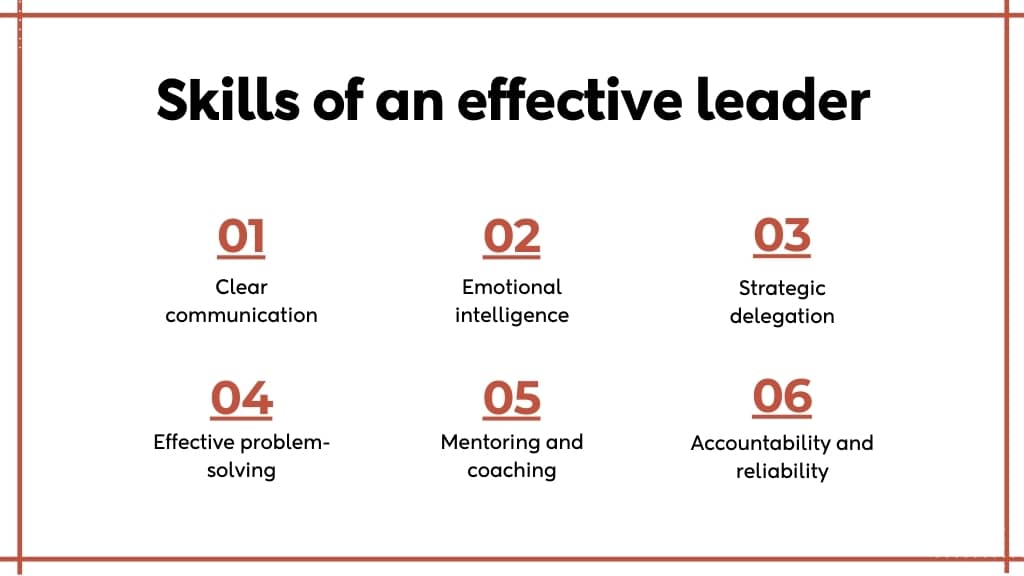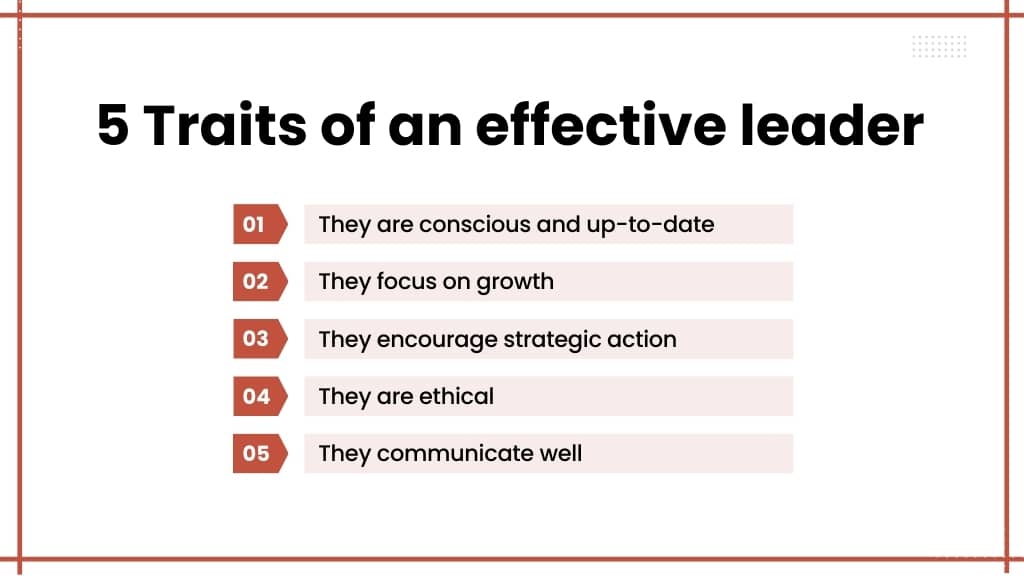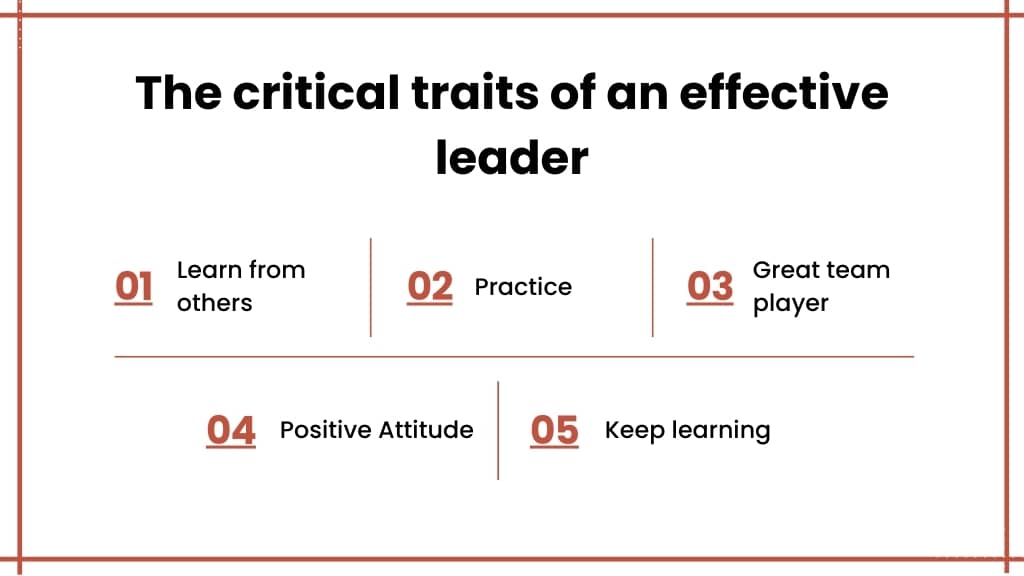Introduction
Leadership isn’t just about holding a position of power, it’s about guiding a team towards achieving shared goals. Great leaders are characterized by certain skills, which makes them different from others. An ideal leader acquires leadership traits like visionary thinking, decisive action, clear communication, empathy, and resilience.
Every successful leader has always displayed these traits at their workplace. It aids in team motivation, boosts confidence, and encourages the team to bring innovative ideas on the table.
Your journey of becoming an effective leader starts from here. In this blog, we will explore those five traits of an effective leader to take your professionalism to a different level. Let’s get started:
Read more: The role of leadership in helping a team struggling with failure
What is effective leadership?
An effective leadership is the ability to coordinate and motivate the team to attain organizational objectives. It also comes with the responsibility of providing timely support, allocating resources, and mitigating risks. It is all about creating a positive work environment where teams perform well.
A great mentor or leader upholds the team and fosters team collaboration where employees feel unified, and their ideas are valued. An ideal team leader defines objectives, shares directions, and offers support.
Skills of an effective leader:

- Clear communication: Effective leaders are not just good speakers; they adopt clear and impactful communication. They convey ideas clearly, listen actively, and ensure that their messages resonate with the team, leading to improved outcomes and a cohesive work environment.
- Emotional intelligence: This trait involves the ability to listen, understand, and manage emotions thoughtfully. Leaders with emotional intelligence build stronger relationships, navigate conflicts with ease, and create a supportive atmosphere that leads to team success.
- Strategic delegation: A great leader knows their team members very well. This understanding allows them to efficiently assign tasks, delegate responsibilities, and optimize team performance.
- Effective problem-solving: Leaders identify problems head-on, analyze them, and create the best possible solution. This approach addresses immediate problems and prevents future occurrences, fostering a culture of continuous improvement.
- Mentoring and coaching: Beyond just managing, effective leaders act as mentors and coaches. They guide team members through challenges, help them develop their potential, and offer support that leads to team personal and professional growth.
- Accountability and reliability: A true leader takes responsibility for the actions taken by their team members.
A true leader always differs from being a boss. An effective leader guides the entire team by collaborating with them, while a boss directs and manages the team with authority.
Also read: 7 Steps to Lead Diverse Teams Effectively in The Workplace
5 Traits of an effective leader: Are you the one?
An ideal mentor adheres to many traits in their personality, but these five traits are common in every effective leader. Check them below:

1. They are conscious and up-to-date.
An ideal mentor is conscious of changes, especially for the team. They always keep themselves informed about dynamic industrial updates. They stay informed about market trends, competitor activities, and technological advancements. This helps a leader make informed decisions and prepare the team for forthcoming challenges.
2. They focus on growth.
A leader understands that growth is not all about generating results for the company; it’s about enhancing the team’s skillset. An effective leader always promotes a culture of continuous learning and development. They train their team, support them with new strategies, adapt to changes, encourage innovation, and seek growth opportunities.
3. They encourage strategic action.
Leaders encourage strategic action by clearly articulating the vision and objectives, aligning team efforts with overarching goals, and fostering an environment of accountability and innovation. They also continue to provide training and support on their strategies. It helps them develop trust between team members and achieve goals by applying the right approach.
4. They are ethical.
Ethical leadership denotes honesty and reflects integrity at work in decision-making and operations. Such leaders ensure their team trusts them through honesty, high moral standards, and visionary solid thinking. It also includes motivating the team while they are facing setbacks.
5. They communicate well.
Professional leaders are excellent communicators because they actively listen to feedback, talk precisely, and ensure their message aligns with the goals. They foster an environment of open communication and encourage teams to raise questions. They create a supporting environment where team members feel valued and heard.
Thrive as a leader: Top 5 inclusive leadership skills for a thriving workplace
What are the qualities of a good leader?
Being a leader is an easy process. However, being an effective leader or a good mentor requires practice and implementation.
Besides traits, an ideal leader has these personal qualities in their lifestyle:
- Visionary: They outline objectives and establish a clear vision of the future.
- Integrity: They are honest and cannot be trusted to lie about something
- Decisiveness: They make decisions efficiently and take responsibility for outcomes.
- Communication skills: A true leader is always a good listener. They share ideas and foster open communication.
- Emotional intelligence: They understand the team’s emotional dynamic well and provide support when needed.
Developing the critical traits of an effective leader
Becoming an effective leader will require practice, consistent work, and self-reflection. Here are some key points to consider:

1. Learn from others
Take your time, watch the leaders who inspire you, and write down the qualities you can adopt. Review literature discussing influential leaders and read books, articles, and case studies about the same. You can also practice in leadership workshops and conferences to become an effective leader.
2. Practice
Leadership is a process and a skill that enables the direction of employees in an organization, and it is learned through practice. You can volunteer for leadership positions in your organization, but before that, you need to build trust, be empathetic, communicate effectively, and empower your team. Don’t forget to follow those five traits that we have discussed above in this blog post.
3. Great team player
Influential leaders are great team players. They know how to collaborate with the team and cooperate to achieve the determined goal. Build a healthy bond with your team and provide support whenever needed. Focus on knowing your team’s expertise and polishing their skills promptly.
4. Positive Attitude
A positive attitude in a leader inspires and motivates the team. Start looking at the possibilities rather than what is going wrong in the workplace. Be optimistic towards any goal and support your team in solving any problem. Adhering to a positive attitude always cheers your teammates and builds trust.
5. Keep learning
Leadership is not a destination; it is a lifelong process. There is always something to learn and something to do better. Learn about the ongoing changes in the industry and what is being done to promote its efficiency. Look for learning and development exercises, and keep pushing your limits to be an effective leader.
Know more: The Ultimate Playbook for Building High-Performing Teams in 2023
Conclusion
Leadership development can be a long and challenging process, but with perseverance, humility, and passion for growth within the workplace, the end journey is worth it. Following the five leadership traits discussed in this blog, one can aspire to become a valuable leader.
Remember, leadership consists of motivating people. Reinforcing teamwork and team motivation is essential for becoming a true leader. It is not all about authority but also about earning respect, team collaboration, and inspiring others.

















No Comments